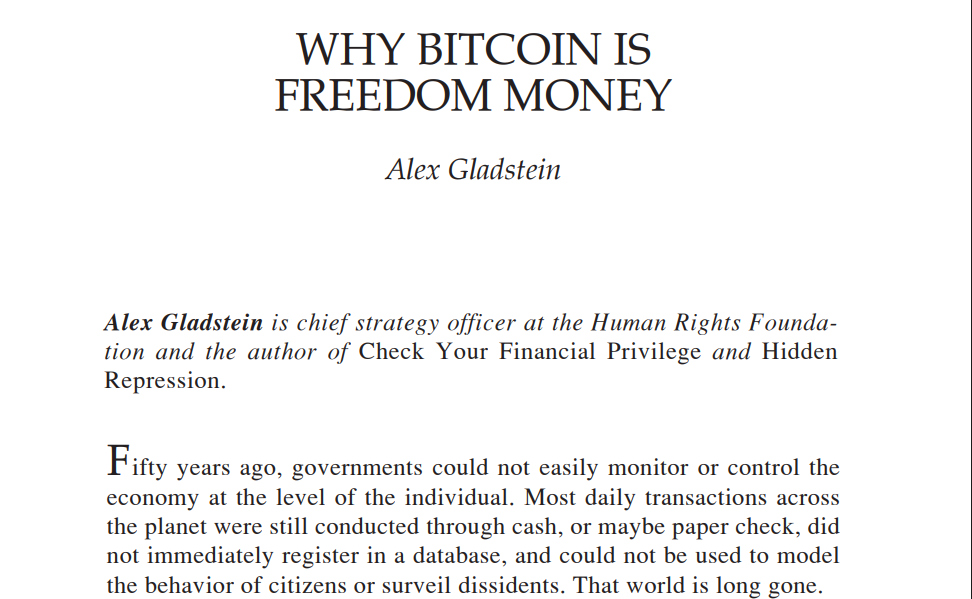Good morning, readers!
In China, the central bank has opened a new international operations center for the digital yuan in Shanghai to expand the central bank digital currencies’ (CBDCs) role in global finance. The initiative aims to extend Beijing’s model of programmable, state-controlled money beyond its borders, providing an authoritarian blueprint for CBDCs. Through this, China is positioning the digital yuan as both a financial innovation and a vehicle for state power.
Meanwhile, in Nicaragua, a new report details how the Ortega-Murillo dictatorship has stripped away the country’s most basic rights through repeated legal reforms. Constitutional changes have concentrated power in the presidency, enabling arbitrary detentions, torture, and enforced disappearances of dissidents. The result is hundreds of Nicaraguans denationalized or expelled, and civil society gutted through regime asset seizures and financial repression.
In freedom tech news, Sparrow Wallet, an open-source and self-custodial Bitcoin wallet, released support for sending to Silent Payment addresses. This privacy tool creates a way for users to share a single static Bitcoin address to receive payments, which generates unique addresses for each transaction. This can enhance the privacy of civil society’s financial activities worldwide and make it more difficult for dictators or surveillance firms to track incoming funds or donation networks.
We end with an essay from HRF’s chief strategy officer, Alex Gladstein, who explains in the Journal of Democracy why Bitcoin is best thought of as freedom money. He traces how governments have used modern financial systems to surveil and repress, and how Bitcoin provides an alternative. We highly encourage you to read this piece to understand why, in an age of financial surveillance, Bitcoin represents a pathway to individual and financial freedom.
Now, let’s get into it.
Global News
China | Opens International Operations Center for Digital Yuan
China’s central bank opened a new international operations center for the digital yuan in Shanghai, aiming to expand the CBDC’s role in international trade and cross-border payments. Central bank deputy governor Lu Lei hailed the move as a “historical inevitability” in monetary systems. The Chinese Communist Party (CCP) has already partnered with central banks across authoritarian regimes, including those in Thailand, the United Arab Emirates, and Saudi Arabia, on cross-border tests. In a similar vein, the Cyberspace Administration of China began encouraging more financial institutions to use the digital yuan in cross-border transactions. While purporting to advance financial modernization, the digital yuan’s international operations center represents Beijing’s formal attempt to export its model of programmable, state-controlled money beyond its borders. The initiative also positions the digital yuan as a competitor to existing US dollar-based payment rails.
Nicaragua | Human Rights Guarantees Eliminated
In Nicaragua, the Ortega-Murillo dictatorship has used a wave of legal reforms to strip away the country’s most basic rights. A new UN Human Rights Office report explains how extensive constitutional changes in 2025 concentrated power in the presidency, leaving dissidents and their family members vulnerable to arbitrary detention and retaliation. The damage is stark: 75 political prisoners remain incarcerated, with confirmed cases of torture, enforced disappearances, and hundreds of Nicaraguans stripped of their nationality or expelled. Since 2018, civil society has been decimated, with 80% of organizations shut down and their assets seized. The regime has closed more than 5,600 NGOs in total. This combination of legal and financial repression lays bare how authoritarian regimes weaponize institutions to weaken civil society.
World | SWIFT Eyes Blockchain Payment System Overhaul
Global payment network SWIFT, along with more than 30 major banks, is moving to overhaul current cross-border payment systems with a blockchain-based “shared digital ledger.” The plan seeks instant, 24/7 global transfers interoperable with stablecoins and central bank digital currencies “being developed by the likes of China.” SWIFT’s network effect (spanning 200 countries and 11,000 banks) already processes trillions of dollars daily. But unlike SWIFT’s existing system, which still relies on independent banks to execute transfers, a unified blockchain ledger would likely centralize transaction validation and enforcement, making it easier to monitor, freeze, or automatically block funds at scale. What begins as an upgrade for efficiency risks evolving into an infrastructure for real-time financial surveillance. In the wrong hands, it could make dissent more costly and financial autonomy harder to preserve.
Tunisia | Price Controls to Curb Inflation
Tunisia’s Ministry of Commerce has imposed new price caps on bananas in an attempt to contain soaring food inflation. Price controls of 5 dinars per kilogram for Egyptian-imported bananas and 7 dinars for others are now in effect. To enforce it, officials increased crackdowns on informal markets, redistributing confiscated fruit through “official” outlets at state-set prices. The move exposes the regime’s growing reliance on price controls and market intervention to mask deeper financial fragility. Government debt has risen to nearly 80% of GDP, and inflation continues to erode families’ purchasing power as they too turn to debt to make ends meet. Repression is also deepening on other fronts. A Tunisian court recently sentenced a man to death for Facebook posts critical of President Kais Saied, a shocking and unprecedented punishment that reveals the regime’s willingness to silence dissent by any means.
Afghanistan | Regime Shuts Down Internet
The Taliban regime in Afghanistan has implemented a nationwide Internet blackout. The shutdown began on Sept. 16 with regional outages and expanded into a full countrywide blackout on Sept. 29. Officials previously justified earlier blackouts as a way to stop “immoral activities,” but no reason has been provided for the total ban. The blackout has disrupted financial services, hospitals, airports, businesses, and humanitarian efforts in a country still recovering from a recent earthquake. Women and girls, who are already restricted from most education, have lost access to the online learning that the Internet has made possible. This blackout is a dangerous restriction on information, speech, and transactions, leaving 43 million Afghans, including dissidents and freedom fighters, almost wholly cut off from the outside world.
Recommended Content
Why Bitcoin Is Freedom Money by Alex Gladstein
In this essay for the Journal of Democracy, HRF Chief Strategy Officer Alex Gladstein makes the case for Bitcoin as a vital safeguard against the growing prevalence of financial repression in authoritarianism. He traces how governments have shifted from limited financial control in the cash era to near-total surveillance and censorship in today’s centralized digital payment systems, where officials can freeze accounts, monitor transactions, and debase currencies at will. Drawing on examples from China to Egypt, Gladstein explains how financial repression undermines freedom and how Bitcoin’s open, borderless design provides individuals with an alternative: a form of “freedom money” that overcomes inflation, censorship, and isolation. Read it here.
Bitcoin and Freedom Tech News
Sparrow Wallet | Implements Send to Silent Payments
Sparrow Wallet, an open-source and self-custodial Bitcoin wallet, released support for sending to Silent Payment addresses, a type of static Bitcoin address that improves privacy. Unlike traditional addresses, which risk exposure if reused, Silent Payments generate a unique destination address for each transaction. This allows a nonprofit or dissident to publish a single payment address while avoiding address reuse and the surveillance risks it creates. In doing so, it reduces the ability of authoritarian officials to track incoming funds, helping strengthen financial privacy and, by extension, their activist and donation networks. Sparrow currently supports sending to Silent Payments from software wallets. Hardware wallet integration is being planned for future updates.
Breez | Shares Q3 Lightning Integrations
The Breez SDK, a toolkit that simplifies adding self-custodial Lightning payments into apps, shared its latest cohort of integrations. Among them is Bitnob, an African financial app that enables individuals and businesses to send and receive bitcoin, offering protection from unstable local currencies. Other projects include SwapSo, an Indian app that provides alternatives to government payment rails like UPI and the digital rupee CBDC, and EvoMone, a messaging app built on the Signal protocol that allows users to attach Bitcoin payments directly to chats. While these integrations are a promising avenue for more reliable savings and censorship-resistant payments, they remain early implementations that will need testing to confirm their security, privacy, and usability.
LNVPN | Permissionless VPN Tool
LNVPN is a privacy-focused service that offers VPN connectivity and global eSIM data without the need for accounts or emails. Payments can be made with Bitcoin, making the service more accessible. Using Bitcoin to pay for VPNs is common in places like Iran, where the oppressive clerical regime actively limits both digital and financial freedoms. For activists and dissidents, tools like this can help reduce exposure to autocratic surveillance and enable mobile connectivity in over 200 countries. It is great to see more VPNs accept more permissionless payment methods.
Bitcoin Babies | “The Sovereign Mother” Book
“The Sovereign Mother,” the first book from the Bitcoin Babies program, is soon set for release. The book is written by HRF grantee Bitcoin Babies, a project founded by Naomi Wambui that tackles infant malnutrition and financial exclusion under authoritarian regimes. It includes weekly Bitcoin stipends, nutrition and financial literacy training, and community support to help mothers improve their children’s health while building long-term financial stability and resilience to repression.
Bitplebs Summit | Building India’s Bitcoin Future
From Nov. 1-2, India’s Bitcoin community will gather in Goa for the Bitplebs Summit, a grassroots event uniting developers, educators, activists, and everyday users. The summit will feature workshops, panels, and hands-on sessions across topics. HRF’s Bitcoin Development Fund Operations Associate Judy Imasuen will attend and share how Bitcoin’s free and open-source software is transforming lives and supporting financial freedom in authoritarian contexts. For dissidents and citizens navigating India’s tightening financial controls, events like the Bitplebs Summit help grow a parallel ecosystem where Bitcoin can support civil society with free exchange, open collaboration, and financial sovereignty. Learn more here.
OpenSats | Announces 14th Wave of Bitcoin Grants
OpenSats, a public nonprofit that funds free and open-source software and projects, announced its 14th wave of grants supporting the Bitcoin protocol. Renewed funding for BTCPay Server supports a leading open-source payment processor that enables those in authoritarian contexts to accept bitcoin without relying on intermediaries. Stratum V2, another grantee, is advancing bitcoin mining decentralization by enabling solo miners to propose their own block templates. This reduces reliance on centralized mining pools and improves Bitcoin’s censorship resistance. Learn about other grantees here.
Recommended Content
lightning++ Developer Conference Livestream
The lightning++ developer conference livestream is now available to watch online. Over three days in Berlin, builders and developers explored how the Lightning Network is expanding Bitcoin’s capacity for fast, private, and programmable payments. Sessions covered new tools and protocols that make censorship-resistant payments more accessible, highlighting how Lightning continues to evolve as an instrument of financial freedom for activists, nonprofits, and everyday users worldwide. Watch the livestream of Day 1, Day 2, and Day 3 here.








